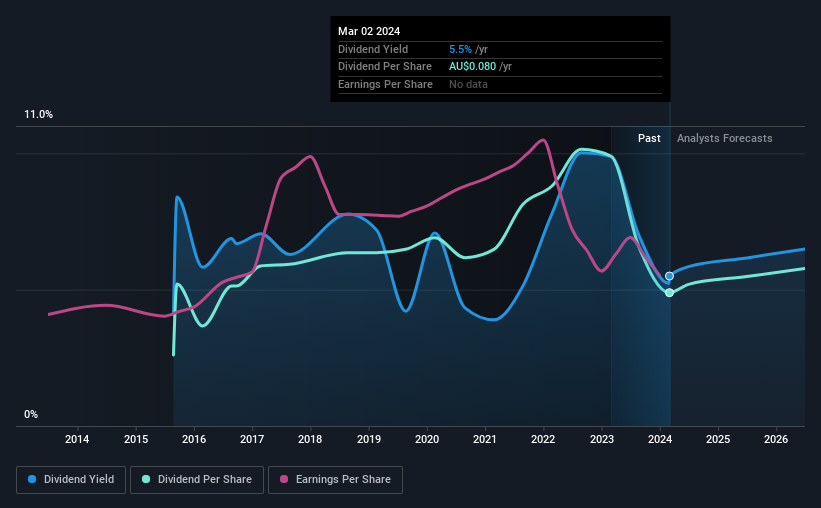It Might Not Be A Great Idea To Buy Australian Finance Group Limited (ASX:AFG) For Its Next Dividend
It looks like Australian Finance Group Limited (ASX:AFG) is about to go ex-dividend in the next four days. The ex-dividend date is one business day before a company's record date, which is the date on which the company determines which shareholders are entitled to receive a dividend. The ex-dividend date is of consequence because whenever a stock is bought or sold, the trade takes at least two business day to settle. Meaning, you will need to purchase Australian Finance Group's shares before the 7th of March to receive the dividend, which will be paid on the 25th of March.
The company's next dividend payment will be AU$0.04 per share, on the back of last year when the company paid a total of AU$0.08 to shareholders. Based on the last year's worth of payments, Australian Finance Group stock has a trailing yield of around 5.5% on the current share price of AU$1.455. We love seeing companies pay a dividend, but it's also important to be sure that laying the golden eggs isn't going to kill our golden goose! So we need to investigate whether Australian Finance Group can afford its dividend, and if the dividend could grow.
See our latest analysis for Australian Finance Group
Dividends are typically paid from company earnings. If a company pays more in dividends than it earned in profit, then the dividend could be unsustainable. Australian Finance Group paid out more than half (73%) of its earnings last year, which is a regular payout ratio for most companies.
Companies that pay out less in dividends than they earn in profits generally have more sustainable dividends. The lower the payout ratio, the more wiggle room the business has before it could be forced to cut the dividend.
Click here to see the company's payout ratio, plus analyst estimates of its future dividends.
Have Earnings And Dividends Been Growing?
Companies with falling earnings are riskier for dividend shareholders. If earnings fall far enough, the company could be forced to cut its dividend. Australian Finance Group's earnings per share have fallen at approximately 6.6% a year over the previous five years. Ultimately, when earnings per share decline, the size of the pie from which dividends can be paid, shrinks.
Many investors will assess a company's dividend performance by evaluating how much the dividend payments have changed over time. Australian Finance Group has delivered an average of 7.3% per year annual increase in its dividend, based on the past nine years of dividend payments. Growing the dividend payout ratio while earnings are declining can deliver nice returns for a while, but it's always worth checking for when the company can't increase the payout ratio any more - because then the music stops.
Final Takeaway
Has Australian Finance Group got what it takes to maintain its dividend payments? We're not overly enthused to see Australian Finance Group's earnings in retreat at the same time as the company is paying out more than half of its earnings as dividends to shareholders. Australian Finance Group doesn't appear to have a lot going for it, and we're not inclined to take a risk on owning it for the dividend.
With that in mind though, if the poor dividend characteristics of Australian Finance Group don't faze you, it's worth being mindful of the risks involved with this business. For instance, we've identified 2 warning signs for Australian Finance Group (1 shouldn't be ignored) you should be aware of.
If you're in the market for strong dividend payers, we recommend checking our selection of top dividend stocks.
Have feedback on this article? Concerned about the content? Get in touch with us directly. Alternatively, email editorial-team (at) simplywallst.com.
This article by Simply Wall St is general in nature. We provide commentary based on historical data and analyst forecasts only using an unbiased methodology and our articles are not intended to be financial advice. It does not constitute a recommendation to buy or sell any stock, and does not take account of your objectives, or your financial situation. We aim to bring you long-term focused analysis driven by fundamental data. Note that our analysis may not factor in the latest price-sensitive company announcements or qualitative material. Simply Wall St has no position in any stocks mentioned.

